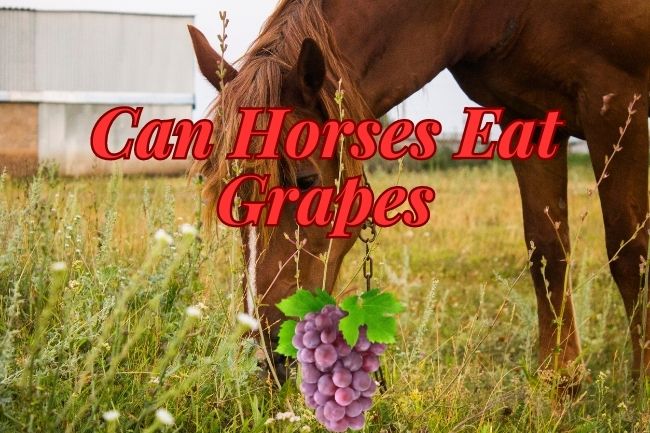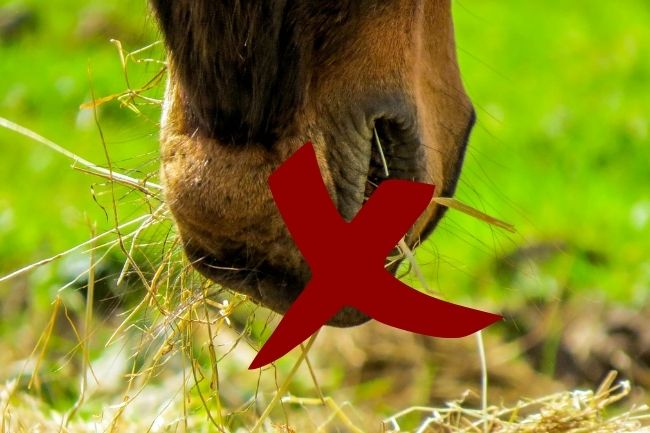Can horses eat grapes? Well, the answer is yes, but with caution. While grapes are not toxic to horses, they should be given sparingly. Please refer to the article below for detailed information.

1. Can horses eat grapes?
The answer is yes, but with caution. In this section, we will delve into the details of the reasons why horses should not eat too much grapes. Here are the points to be addressed:
- Toxins in grapes: Grapes contain a substance called tannin and other toxic compounds that can be harmful to the horse’s digestive system. Tannin is a plant defense compound that can impair nutrient absorption and cause digestive disturbances in horses. When horses consume grapes, these tannins can lead to gastric and intestinal ulceration, resulting in diarrhea and an increased risk of colitis.
- Risk of colic: Grape seeds and skins can also pose a risk of colic in horses. Horses are unable to effectively digest them, and they can obstruct the horse’s digestive tract, causing pain and discomfort. If not promptly addressed, colic can weaken the horse’s health and even pose a life-threatening danger.
- Potential for dizziness: Grapes naturally contain a high amount of sugar. When horses consume grapes, the sugar in the grapes is rapidly absorbed into the digestive system, leading to a sudden increase in blood sugar levels. This can result in dizziness and decreased performance in horses. Additionally, continued supply of grape sugars can increase the risk of developing diabetes and excessive weight gain in horses.
Pause here and conclude this section by emphasizing that horses should not eat grapes due to the potential health risks they pose. Furthermore, always check and ensure that the horse’s diet is suitable for their nutritional needs.
2. Safe alternatives to grapes:
In this section, we will discuss safe and suitable alternatives to grapes in a horse’s diet. Here are some types of food that horses can safely eat and benefit from:
- Grass: Grass is the primary source of food for horses. Fresh grass provides fiber and essential nutrients. Ensure that the grass horses are exposed to is not toxic or contains thorny plants that could cause injury to the horse.
- Hay: Hay is also a good choice for horses. It provides fiber and can help maintain a healthy digestive system in horses. Hay can be included in the horse’s diet to provide adequate nutrition.
- Beets: Beets are a popular food source for horses. They are rich in fiber and provide various important vitamins and minerals. Beets can also help maintain a balanced digestive system in horses.
- Apples: Apples are a safe fruit for horses. They are rich in fiber and contain many vitamins. However, it’s important to feed horses apples in moderation to avoid excessive sugar intake.
- Carrots: Carrots are a good food choice for horses. They are rich in vitamin A and provide fiber. Carrots can be fed to horses either fresh or in the form of dried carrot treats.
- Wheatgrass: Wheatgrass is also a good option for horses. It provides fiber and contains important nutrients. Horses can consume fresh wheatgrass or wheatgrass-based supplements.
Conclude this section by emphasizing that horses should not eat grapes due to the potential health risks they pose. Always ensure that the horse’s diet is appropriate for their nutritional needs and include safe alternatives that provide the necessary nutrients.

3. Foods that are harmful to horses:
In this section, we will provide a list of foods that are harmful to horses. Here are the points to be addressed:
- Chocolate: Chocolate contains methylxanthines, such as theobromine and caffeine, which can be dangerous for horses. These substances cannot be properly metabolized by horses and can accumulate as toxins in their bodies, leading to increased heart rate, nervous stimulation, and digestive issues.
- Caffeine: Caffeine is not only found in chocolate but also in coffee, tea, and many energy drinks. Caffeine can cause nervous stimulation, increased heart rate, anxiety, and overall health disturbances in horses.
- Xylitol: Xylitol is a common sugar substitute found in many sugar-free gums, candies, and other sugar-free products. However, for horses, xylitol can significantly increase insulin levels in the blood, posing dangers to the digestive system and causing serious health issues such as liver inflammation and diabetes.
- Toxic grasses: There are certain types of grasses and plants that may contain toxins for horses. For example, ragwort or black locust can contain substances that are toxic or neurologically stimulating to horses. It is important to carefully inspect and remove any potentially harmful grasses before providing them to horses.
- Overfeeding: It is advised that overfeeding horses, especially with starchy and sugary foods, can lead to health issues such as colic and laminitis.
- Moldy feed: Feeding horses moldy or contaminated feed can result in severe health problems such as liver inflammation and respiratory issues.
- Emphasize the importance of being aware of these harmful foods and ensuring that horses are provided with a safe and appropriate diet to maintain their well-being.
4. Best diet for horses:
Beyond the question of whether horses can eat grapes or not, you need to pay more attention to the horse’s diet. The diet is a crucial factor in maintaining the health and optimal development of horses. Here are the basic principles for designing a good diet for horses:
- Grass and fiber-rich food: Horses should be provided with a large amount of fresh grass or hay in their daily diet. Grass contains essential fiber that helps maintain digestive function and provides necessary nutrients. Ensure that the grass is of good quality and free from mold.
- Concentrate feed mix: A small portion of concentrate feed mix can be supplemented to ensure that the horse receives the necessary nutrients. This mix may include grains such as oats, corn, and soybeans.
- Supplementary feed: In addition to grass and concentrate feed mix, horses may be given supplementary feeds such as haylage, grass chaff, and other nutrient-rich feeds. However, the amount of supplementary feed should be adjusted according to the specific nutritional needs and activity level of each horse.
- Clean water: Ensure that horses always have access to clean and fresh water for drinking. Horses require an adequate amount of water to maintain water balance in the body and support digestive function.
- Adjusting the amount of feed: The amount of feed provided to horses should be adjusted based on their weight, age, activity level, and nutritional goals. Consult with a veterinarian or equine nutritionist to ensure an appropriate diet for each horse.
- Nutritional management: Ensure that horses do not suffer from nutritional deficiencies by providing a balanced diet that meets their specific requirements. Regularly assess the horse’s body condition and adjust the diet accordingly.
Remember that the dietary needs of horses may vary depending on factors such as age, breed, workload, and health conditions. It is important to consult with professionals to create an individualized diet plan that promotes the overall well-being of each horse.
In conclusion, when it comes to the question “Can horses eat grapes?” the answer is yes, but with caution. While grapes are not toxic to horses, they should be given in moderation as an occasional treat. It’s important to consider your horse’s specific dietary needs and any underlying health conditions. Always consult with a veterinarian or equine nutritionist for guidance on incorporating grapes or any other new foods into your horse’s diet. Remember, a balanced and well-managed diet is essential for your horse’s overall well-being and health.
Source: Baolamdep.com